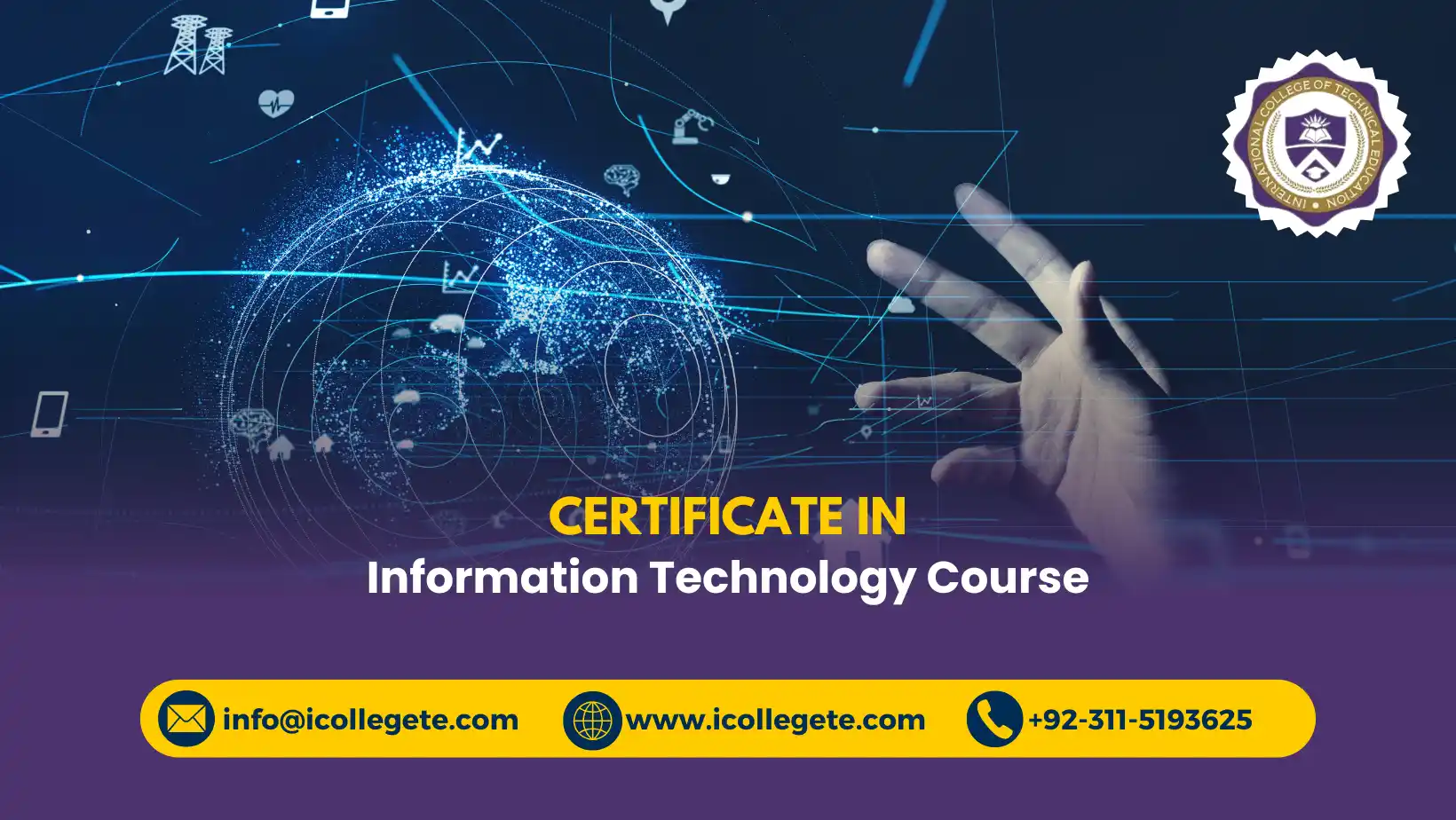Step confidently into the digital age with the Certificate in Information Technology (CIT) Course in Rawalpindi, a foundational training program designed to equip learners with essential IT skills for academic, professional, and personal growth. Certificate in Information Technology Course is ideal for students, job seekers, and professionals who want to build a strong understanding of core computer applications, internet technologies, and digital productivity tools.
Delivered by experienced instructors in Rawalpindi, the CIT course offers hands-on training in key areas such as computer fundamentals, Microsoft Office, internet usage, email communication, and basic troubleshooting. Learners will gain practical experience in navigating operating systems, managing files, creating documents, and using spreadsheets and presentations effectively.
Whether you’re preparing for a job, planning to pursue further IT education, or simply want to become more confident with technology, Certificate in Information Technology Course provides a structured and accessible learning path. The curriculum is designed to meet the needs of beginners while offering valuable insights for those with some prior exposure to computers.
By the end of the Certificate in Information Technology Course, students will be able to perform everyday IT tasks with confidence, communicate digitally, and apply their skills in academic, office, or freelance environments. The Certificate in Information Technology Course in Rawalpindi is your gateway to digital literacy and professional readiness in today’s tech-driven world.
Course Overview
The Certificate in Information Technology Course in Rawalpindi is a course-level program designed to introduce learners to the essential components of modern computing. Structured into six focused study units, the Certificate in Information Technology Course provides a comprehensive foundation in digital tools and practices that are vital across industries and educational settings.
Each unit targets a specific area of IT proficiency, including computer basics, word processing, spreadsheets, presentations, internet usage, and email communication. Through guided instruction and practical exercises, learners develop the ability to perform common digital tasks with accuracy and efficiency. The Certificate in Information Technology Course emphasizes usability, clarity, and hands-on learning, making it ideal for beginners and those seeking to refresh their skills.
What sets Certificate in Information Technology Course apart is its accessibility and relevance to a wide audience. Whether you’re a student preparing for higher education, a professional aiming to improve workplace productivity, or someone transitioning into a tech-savvy role, the CIT course offers practical value. With six structured units and a focus on real-world application, it empowers learners to become confident users of technology and prepares them for further specialization or employment in IT-related fields.
Study Units
- Introduction to Computer Fundamentals and Operating Systems
- Microsoft Word and Document Formatting Techniques
- Microsoft Excel for Data Entry and Basic Calculations
- Microsoft PowerPoint for Professional Presentations
- Internet Usage, Web Browsing, and Online Safety
- Email Communication, File Sharing, and Digital Etiquette
Learning Outcomes for this Course
Understanding Computer Basics and Operating Systems
- Identify key components of a computer system and their functions
- Navigate Windows operating system and manage files and folders
- Perform basic system operations such as copy, paste, and file organization
- Understand input/output devices and peripheral connectivity
- Apply basic troubleshooting techniques for common system issues
- Recognize different types of software and their uses
- Maintain system hygiene through updates and antivirus tools
Document Creation and Word Processing
- Create, format, and edit professional documents using Microsoft Word
- Apply paragraph styles, headers, footers, and page layout settings
- Insert tables, images, and hyperlinks into documents
- Use spelling and grammar tools for error-free writing
- Save, print, and export documents in various formats
- Design resumes, letters, and reports using templates
- Understand file types and compatibility for word processing
Spreadsheet Management and Data Handling
- Enter and organize data using rows, columns, and cells in Excel
- Apply basic formulas and functions for calculations
- Format cells, adjust column widths, and apply borders
- Create simple charts and graphs for data visualization
- Use sorting and filtering tools for data analysis
- Save and share spreadsheets in compatible formats
- Understand spreadsheet applications in business and education
Presentation Design and Delivery
- Create engaging slides using Microsoft PowerPoint
- Apply themes, transitions, and animations to enhance presentations
- Insert multimedia elements such as images, audio, and video
- Organize content for clarity and audience engagement
- Use presenter view and slide notes for effective delivery
- Export presentations to PDF or video formats
- Understand best practices for professional presentation design
Internet Navigation and Online Safety
- Browse websites using different search engines and browsers
- Understand URL structures and secure website indicators
- Use bookmarks, tabs, and history for efficient browsing
- Recognize online threats and apply safety measures
- Understand the basics of cloud storage and online tools
- Access educational and productivity platforms online
- Practice responsible digital behavior and data privacy
Email and Digital Communication
- Create and manage email accounts using popular platforms
- Compose, send, and reply to professional emails
- Attach files and use formatting tools in email messages
- Organize inboxes using folders and labels
- Understand CC, BCC, and email etiquette
- Use email for job applications and formal communication
- Integrate email with calendar and task management tools
Entry Requirements for this Course
- Age Requirement Applicants must be at least 16 years old to enroll. This ensures learners have the maturity to engage with digital tools and classroom instruction.
- Educational Qualification A minimum of middle school education (8th grade) is required. Students with matriculation or higher qualifications will benefit more from the course content.
- Work Experience No prior work experience is necessary. The course is designed for beginners and those with limited exposure to computers or IT environments.
- Language Proficiency Basic understanding of English or Urdu is essential. Course materials and software interfaces may include terminology that requires functional language skills.
- Computer Access (Recommended) While not mandatory, having access to a personal computer or laptop is highly recommended. This allows learners to practice outside class hours and complete assignments effectively.
- Learning Commitment Students should be willing to attend regular sessions and complete practical exercises. A consistent learning attitude is key to mastering the course content.
- Interest in Digital Skills A genuine interest in learning computer applications and digital communication will enhance the learning experience and long-term skill development.
Course Benefits of this Course
Foundational Digital Literacy
- Learn essential computer operations and system navigation
- Understand the role of hardware and software in everyday tasks
- Build confidence in using Windows and basic applications
- Develop familiarity with file management and storage systems
- Gain awareness of digital safety and responsible usage
- Improve typing speed and accuracy for professional tasks
- Learn to troubleshoot basic computer issues independently
- Prepare for further IT learning with a strong foundation
- Become a confident user of digital tools in academic and work settings
Workplace Productivity Skills
- Master Microsoft Word for creating professional documents
- Use Excel for organizing data and performing calculations
- Design impactful presentations using PowerPoint
- Apply formatting and layout techniques for clarity and style
- Communicate effectively through email and digital platforms
- Manage schedules and tasks using digital calendars and tools
- Improve efficiency in office and remote work environments
- Learn to collaborate using shared files and cloud tools
- Enhance employability with practical software proficiency
Career and Job Readiness
- Build a resume-ready skill set for entry-level IT roles
- Prepare for administrative, clerical, and support positions
- Gain confidence in applying for jobs online
- Understand digital communication etiquette for professional settings
- Learn to manage digital records and documentation
- Use IT skills to support customer service and data entry roles
- Increase competitiveness in local and international job markets
- Access freelance and remote work opportunities
- Align with employer expectations for basic IT proficiency
Academic and Educational Support
- Use word processing tools for assignments and reports
- Create presentations for classroom and seminar use
- Organize research data using spreadsheets
- Access online learning platforms and resources
- Submit assignments and communicate with instructors digitally
- Improve academic performance through digital organization
- Learn to format documents according to academic standards
- Use email for formal academic correspondence
- Prepare for further studies in IT and computer science
Personal Development and Everyday Use
- Manage personal finances using spreadsheet tools
- Create digital documents for home and community use
- Communicate with friends and family via email
- Browse the internet safely and effectively
- Use online services for shopping, banking, and travel
- Organize personal schedules and reminders digitally
- Store and share photos, documents, and media securely
- Learn to use productivity apps for daily tasks
- Become more independent in managing digital life
Freelance and Entrepreneurial Applications
- Offer basic IT services such as data entry and formatting
- Create marketing materials and business documents
- Manage client communication through email and online platforms
- Use spreadsheets for budgeting and inventory tracking
- Design presentations for pitches and proposals
- Build a digital portfolio of work samples
- Learn to operate in online marketplaces and freelance platforms
- Support small business operations with IT tools
- Gain confidence in managing digital aspects of entrepreneurship
Community and Social Impact
- Support local organizations with digital documentation
- Help others learn basic computer skills
- Contribute to digital literacy initiatives in your area
- Use IT skills to organize community events and outreach
- Create awareness materials and presentations for social causes
- Communicate with stakeholders through professional emails
- Maintain digital records for community projects
- Promote responsible digital behavior among peers
- Empower others through shared digital knowledge
Pathways to Further Learning
- Prepare for advanced IT certifications and diplomas
- Build readiness for specialized software training
- Explore web design, graphic design, or coding courses
- Transition into technical support or helpdesk roles
- Join workshops on digital marketing and online tools
- Learn to integrate IT with business and administration
- Access online courses and global learning platforms
- Develop skills for remote and hybrid work environments
- Continue building a career in the digital economy
Who Should Enroll in this Course
- Students Completing Secondary or Higher Secondary Education Ideal for those who have recently completed 8th, 10th, or 12th grade and want to build foundational IT skills for academic and career readiness.
- College and University Students Learners pursuing degrees in any field who need to enhance their digital literacy and improve academic productivity through IT tools.
- Job Seekers and Fresh Graduates Individuals preparing to enter the workforce who require essential computer skills to meet employer expectations in administrative or support roles.
- Office Assistants and Clerical Staff Professionals working in administrative roles who need to improve their efficiency in document handling, data entry, and communication.
- Freelancers and Online Workers Those offering services such as data entry, virtual assistance, or content creation who need to master basic IT tools for remote work.
- Small Business Owners and Entrepreneurs Individuals managing small enterprises who want to handle documentation, communication, and data management independently.
- Teachers and Educators Academic professionals seeking to integrate digital tools into their teaching methods, content creation, and student communication.
- Homemakers Seeking Digital Empowerment Individuals managing households who want to learn IT skills for personal use, online communication, or home-based work opportunities.
- Career Changers Entering the IT Field Professionals from non-technical backgrounds transitioning into roles that require basic computer proficiency.
- Retail and Sales Staff Employees in customer service or sales roles who need to manage digital records, billing, and inventory using basic IT tools.
- Healthcare and Allied Professionals Medical staff and support workers who need to manage patient records, reports, and communication using digital systems.
- Call Center and BPO Employees Individuals working in customer support who require fast typing, email handling, and data entry skills.
- Field Technicians and Service Providers Workers in technical support or maintenance roles who need to document service reports and communicate digitally.
- NGO and Community Workers Professionals involved in social work or community outreach who need to prepare reports, presentations, and digital communication.
- Aspiring Digital Marketers Beginners looking to enter the digital marketing field who need a strong foundation in IT tools before advancing to specialized platforms.
- Job Seekers Abroad Individuals preparing for overseas employment where basic IT skills are a prerequisite for administrative or technical roles.
- Youth in Rural or Underserved Areas Learners from remote regions seeking digital empowerment and access to online education or job opportunities.
- Retired Professionals Seeking Digital Skills Seniors who want to stay connected, manage personal tasks, or explore online services and communication tools.
- Individuals Preparing for Government Jobs Candidates applying for public sector roles where computer literacy is a mandatory requirement for selection.
- Anyone Interested in Becoming Digitally Literate Any individual, regardless of age or background, who wants to confidently use computers, the internet, and digital tools in daily life.
Future Progression for this Course
Advanced Computer Courses
- Enroll in Diploma in Information Technology (DIT) for broader technical coverage
- Join short courses in computer hardware and troubleshooting
- Learn advanced Microsoft Office tools including Access and Outlook
- Explore training in database management systems like MySQL or MS SQL
- Take specialized courses in typing speed and accuracy improvement
- Study advanced internet applications and cloud computing basics
- Gain skills in digital file management and system optimization
Graphic and Multimedia Skills
- Progress to graphic design courses using Adobe Photoshop and Illustrator
- Learn video editing with tools like Adobe Premiere or Filmora
- Explore animation and multimedia presentation techniques
- Join workshops on digital storytelling and content creation
- Build skills in logo, flyer, and social media post design
- Understand visual branding for small businesses and startups
- Prepare for freelance work in multimedia and design
Web and Digital Marketing Fundamentals
- Enroll in basic web development courses (HTML, CSS, JavaScript)
- Learn content management systems like WordPress
- Take introductory courses in SEO and social media marketing
- Understand email marketing and campaign tools
- Explore affiliate marketing and e-commerce platforms
- Build foundational skills for digital entrepreneurship
- Prepare for entry-level roles in online marketing and website management
Freelancing and Remote Work Readiness
- Join freelancing platforms like Fiverr and Upwork
- Learn client communication and project management basics
- Build a digital portfolio showcasing IT skills
- Understand online payment systems and invoicing tools
- Take courses in virtual assistance and remote support
- Explore online teaching and tutoring opportunities
- Develop skills for managing freelance projects independently
Technical Support and Helpdesk Roles
- Train in basic troubleshooting and customer support workflows
- Learn ticketing systems and remote desktop tools
- Understand common software and hardware issues
- Prepare for entry-level IT support positions
- Join helpdesk certification programs
- Build communication skills for technical environments
- Gain experience in user assistance and system documentation
Office and Administrative Applications
- Advance to specialized courses in office automation
- Learn document archiving and digital recordkeeping
- Use spreadsheet tools for budgeting and inventory
- Train in scheduling and calendar management
- Understand digital workflow systems and task tracking
- Prepare for roles in data entry and office coordination
- Build skills for administrative support in various sectors
Educational and Academic Pathways
- Enroll in certificate programs in computer science fundamentals
- Join online learning platforms for structured IT courses
- Prepare for intermediate-level IT diplomas
- Take part in academic workshops on digital tools
- Learn research and documentation techniques using IT
- Support academic projects with digital presentation skills
- Build readiness for teaching assistant or lab support roles
Conclusion
The Certificate in Information Technology Course in Rawalpindi is not just a stepping stone—it’s a launchpad for digital empowerment. Designed for learners from all walks of life, Certificate in Information Technology Course opens doors to practical applications, career readiness, and lifelong learning. What makes Certificate in Information Technology Course truly impactful is its ability to transform everyday users into confident digital contributors. Whether you’re aiming to improve your personal productivity, support a business, or explore freelance opportunities, the skills gained here are immediately applicable and universally relevant. The Certificate in Information Technology Course encourages learners to think beyond the basics and see technology as a tool for growth, communication, and innovation.
Take the Next Step Toward Certificate in Information Technology Course– Enroll Now





